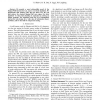1270 search results - page 69 / 254 » Improving Code Density Using Compression Techniques |
132
Voted
EUROCRYPT
2012
Springer
13 years 4 months ago
2012
Springer
Decoding random linear codes is a well studied problem with many applications in complexity theory and cryptography. The security of almost all coding and LPN/LWE-based schemes rel...
98
Voted
CORR
2008
Springer
15 years 2 months ago
2008
Springer
We provide a novel achievability proof of the Slepian-Wolf theorem for i.i.d. sources over finite alphabets. We demonstrate that random codes that are linear over the real field ac...
106
Voted
DCC
2010
IEEE
15 years 9 months ago
2010
IEEE
We present a technique that compresses a string w by enumerating all the substrings of w. The substrings are enumerated from the shortest to the longest and in lexicographic order...
119
click to vote
IWPC
2006
IEEE
15 years 8 months ago
2006
IEEE
The presence of traceability links between software artefacts is very important to achieve high comprehensibility and maintainability. This is confirmed by several researches and ...
114
click to vote
INTERSPEECH
2010
14 years 9 months ago
2010
This paper reports our recent exploration of the layer-by-layer learning strategy for training a multi-layer generative model of patches of speech spectrograms. The top layer of t...

